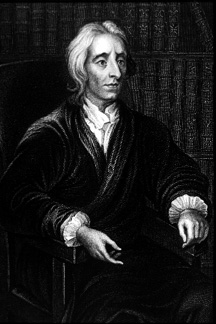John Locke
John Locke (August 29 1632 - October 28 1704) was an English Enlightenment philosopher whose notions of government with the consent of the governed and the natural rights of man (life, liberty, and property) had an enormous influence on colonial Americans, allowing them to justify revolution and shape a new government.
His most influential work was the two part treatise On Civil Government [1]. The first part describes the current condition of the civil government, while the second describes his justification for government and his ideals for its operation. He advocated that all men were equal and that each should be permitted to act as long as he harms no other. Using these foundations, he continued to make a classic justification for private property by declaring that the natural world is the common property of all men, but that any individual could appropriate some bit of it for himself by mixing his labor with the natural resources.
This treatise also introduced the "Lockean proviso" in which Locke stated that the right to take goods from the natural commons is limited by the consideration that "there was still enough, and as good left; and more than the yet unprovided could use;" in other words, that one should not simply take whatever one wanted, one had also to take the common good into consideration.
Locke is considered the protagonist of empiricism, commonly called the "blank slate" or "Tabula rasa" theory. This theory states that all people start out knowing absolutely nothing and that they learn from experiences and trial and error. This is considered the foundation for behaviorism.
John Locke was preceded by a few decades by Samuel Przypkowski on tolerance, by Andrzej Wiszowaty on 'rational religion', both from Polish brethren.
External Links
- Works by Locke on the Web
- Another Locke page
- LibertyForums - Classical Liberal, Libertarian & Objectivist Discussion Board
Locke (a conscious nod to John Locke) was used as an online pseudonym by Peter Wiggin and Valentine Wiggin in the Ender's Game series of books by Orson Scott Card.

